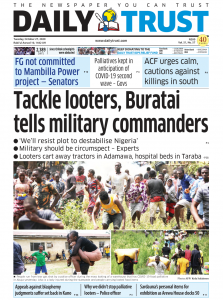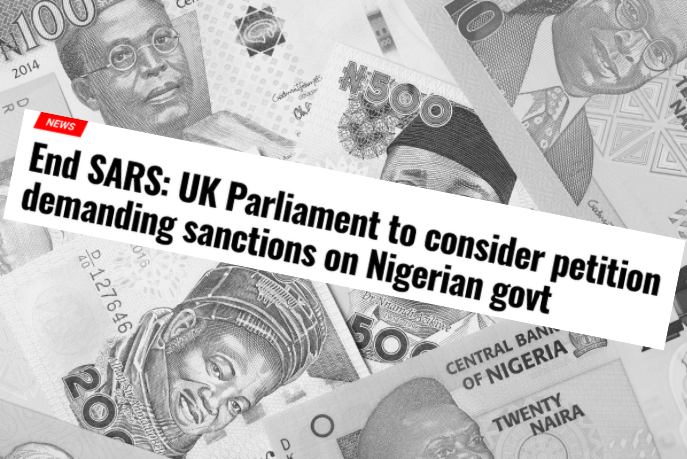As the public sphere witnesses contending narratives of the #EndSARS revolt and what it has triggered in Nigeria in the past three weeks, the Civil Society Legislative Advocacy Centre (CISLAC) has put its foot down against those calling on the international community to impose sanctions on Nigeria. The NGO said in a statement in Abuja that such a move would bring untold hardship on ordinary Nigerians, thereby compounding the economic woes bedeviling the country. It has, therefore, dismissed the call as symptomatic of shortsightedness and totally unpatriotic.

 CISLAC’s statement is coming in the heat of linguistic contestation over the #EndSARS protest and as Nigeria picks up the pieces from days of rage across the country. Many who have intervened have shifted emphasis to how hoodlums hijacked the original protest. But all such voices have been silent on how there came to be so much of hoodlums in the society, hoodlums with the capacity to identify and systematically raid storehouses of food items they know to belong to one level of government or the other.
CISLAC’s statement is coming in the heat of linguistic contestation over the #EndSARS protest and as Nigeria picks up the pieces from days of rage across the country. Many who have intervened have shifted emphasis to how hoodlums hijacked the original protest. But all such voices have been silent on how there came to be so much of hoodlums in the society, hoodlums with the capacity to identify and systematically raid storehouses of food items they know to belong to one level of government or the other.
The military high command in particular is putting the protest to a destabilisation agenda which it says it would not tolerate. Without going further to explain the condition of possibility for destabilisation, such a standpoint risks being labeled a mere securitising practice by which high state officials can designate anything as a threat to a referent object – the Nigerian State in this case. In other words, it is not whether the state is actually threatened or not threatened by some people who might have a destabilizing intent but about subject positioning the Other. What scholars of securitisation warn against is the Ostrich aspect in that governmentality.

 Although CISLAC is categorically against sanctions, it finds it no less scandalous that materials donated by well-meaning Nigerian businesspersons, corporate entities, development partners and others actors under the Coalition Against COVID-19 (CACOVID) were left inexplicably undistributed by the federal, state and local governments, to the point that some of the items have expired or were rotting away. It is even angrier with the Nigerian Governors Forum (NGF) which it credits with making “spurious, baseless and unjustifiable statement” to the effect that the palliatives discovered in some states were mischievous stories by the populace. “This condemnable act is a clear abuse of entrusted power”, said CISLAC in the statement signed by Auwal Musa Rafsanjani, the Executive Director who is insisting that the both the National Assembly and anti-corruption agencies must investigate why the palliatives were not distributed in a timely and transparent manner to the target, vulnerable groups.
Although CISLAC is categorically against sanctions, it finds it no less scandalous that materials donated by well-meaning Nigerian businesspersons, corporate entities, development partners and others actors under the Coalition Against COVID-19 (CACOVID) were left inexplicably undistributed by the federal, state and local governments, to the point that some of the items have expired or were rotting away. It is even angrier with the Nigerian Governors Forum (NGF) which it credits with making “spurious, baseless and unjustifiable statement” to the effect that the palliatives discovered in some states were mischievous stories by the populace. “This condemnable act is a clear abuse of entrusted power”, said CISLAC in the statement signed by Auwal Musa Rafsanjani, the Executive Director who is insisting that the both the National Assembly and anti-corruption agencies must investigate why the palliatives were not distributed in a timely and transparent manner to the target, vulnerable groups.

Angry with the governors for warehousing the palliatives unend
 Additionally, the NGO is asking government at all levels to include community and religious leaders, genuine civil society organisations and representatives from the media in future disbursement of palliatives to ensure transparency in the process, pointing out how the raiding of government and private property and emptying of the palliatives is due to lack of transparency around the essential goods meant to alleviate the hardship faced during the lockdown period April-June, 2020 but which were left undistributed for whatever reasons.
Additionally, the NGO is asking government at all levels to include community and religious leaders, genuine civil society organisations and representatives from the media in future disbursement of palliatives to ensure transparency in the process, pointing out how the raiding of government and private property and emptying of the palliatives is due to lack of transparency around the essential goods meant to alleviate the hardship faced during the lockdown period April-June, 2020 but which were left undistributed for whatever reasons.
The statement commiserates with families of all victims of the fluid situation that developed, especially innocent security personnel who lost their lives and, in some cases, properties during the protest and in the aftermath of the protest. It concludes by requesting that the government and security actors ensure security of citizens by respecting the rights of genuine protesters while arresting miscreants who are bent on theft and vandalism.




























